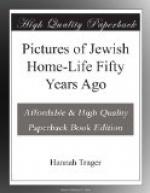“The reason is very clear, for here we have no cheery open fireplaces, which give out so much heat in England; in fact there are not even any steel or iron ovens, and the result is, the Palestinian houses are intensely cold in frosty weather. The ceilings are all lofty and in the shape of a dome, which, with the very thick stone walls is very pleasant in summer but very cold in the winter. Then there is very little firewood to be had here, as the Turks try to prevent much tree-planting, so fire wood is a luxury which very few can afford. Instead, we have all copper buckets pierced with holes standing on a tripod and filled with burning charcoal, which is placed in the middle of the room.
“How we all eagerly cluster round it and watch the red hot charcoal, hoping that by looking at it the warmth will go into our bodies! Such a small amount of charcoal as we can afford does not warm a room very much, so all the windows are closed tightly to prevent any cold air coming in. This also prevents the fumes of the burning charcoal from escaping, so naturally the air gets very stuffy, and many suffer from headaches or fall into a heavy sleep.
“You will wonder why it is many people do not get frozen. Well, the old proverb holds good here, that ‘Necessity is the mother of invention,’ so even in the coldest weather we have a remedy; for we heat also our brass samovar, which holds about thirty glasses of tea, and we drink a glass of hot tea every now and then.
“As the samovar boils all day the steam also sends out some warmth into the room.
“Then, again, the younger children are during the very cold weather kept warm in bed with feather coverlets and pillows, which the elder people try to keep warm in doing the necessary household duties. Very few go out in the streets, except the men when they go to Shule, and the elder boys when they go to the Yeshiba or Cheder, and even they are very often kept at home.
“One comfort is that ‘Father Frost’ does not stay long, so we can manage to bear his icy breath: the greatest hardship is when he visits us on a Sabbath, for of course on that day we cannot heat the samovar and so we have to do with less tea.
“We prepare our Sabbath meals in a small scullery, or porch, in which a small brick oven is built to keep the food hot for the Sabbath. A few pieces of wood are put in, and, when well lighted, the oven is half-filled with charcoal-dust—this again is covered by pieces of tin or lime, and, on top of all, the saucepans are put containing food for the Sabbath meals: also bottles or jars of water are thus kept hot for tea or coffee. Neighbours who are not lucky enough to have such an oven bring in their food, and we let them put it in our ovens. In this way we have enough for every one to drink who may come in. Sometimes twenty poor people come in on a Sabbath day and say: ’Spare me, please, a little hot water?’ No one would think of refusing to give them some, even if they had to share their last glass with them.




